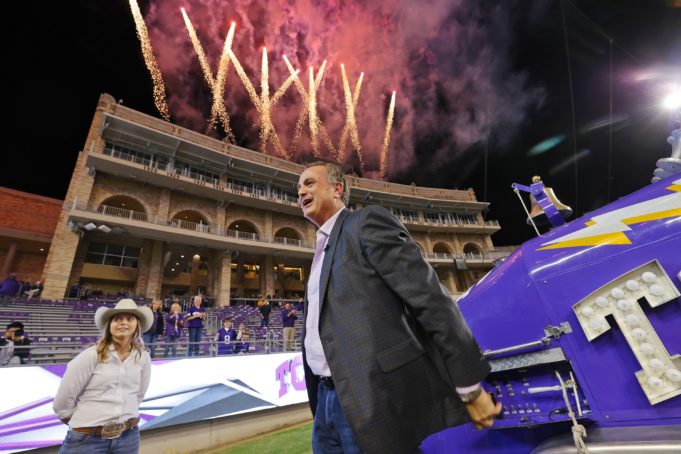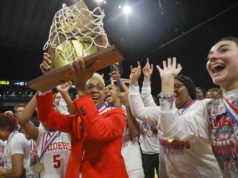The greatest lesson my grandfather ever taught me was: “Buck, not everyone is going to like you.” While I’d argue that maybe a lot of people don’t like me, it was great advice nonetheless. Likewise, there’s no way everyone will be happy with TCU’s hiring of former SMU Mustangs coach Sonny Dykes, but I’m prepared to explain why we’re experiencing the best possible outcome and avoiding what could have been the complete downfall of modern Horned Frog Football.
Dykes, the son of former 13-year Red Raider head coach William “Spike” Dykes, has a history and locality that fans should appreciate. After a brief stint at J.J. Pearce High School in Richardson, Sonny moved throughout the college ranks, beginning at Navarro College in Corsicana as a running backs and quarterbacks coach, working through several schools as an assistant before landing his first head job 15 years later at Louisiana Tech. His three years with the Bulldogs earned him a major-conference promotion to Cal’s Golden Bears, where a forgettable four years dropped him in Gary Patterson’s press box as an offensive analyst before four full seasons at SMU, where he was 2-1 against his former boss.
Let’s address the elephant in the room. Dykes’ record as a head coach is marginal — but still positive. His four years at Cal significantly drag down his overall win-loss total, which is 71-63. After winning one game with the Bears in his first season, Dykes went 5-7 and then 8-5 before 5-7 again. If you’re unfamiliar, Cal — as a culture — doesn’t care about football, and the entire city might as well be sponsored by Birkenstock. For what it’s worth, Dykes’ successor (Justin Wilcox) also has a losing record after five seasons and is rumored to be leaving Berkeley. If you evaluate Sonny’s acumen in adding structural piers to a sinking program, his track record is excellent. After missing bowl eligibility in the Bulldogs’ first season under Dykes, they won eight and then nine games during the subsequent two seasons. His record with the Mustangs was almost identical. SMU missed bowl eligibility by one game during his first season but doubled that victory total for the Ponies’ first 10-win season since 1984 and won seven of their 10 total games during the COVID season. Dykes, even at Cal, has a proven formula of improving the teams where he coaches, especially where campus support is present. Moreover, his experience and connections are widespread, having coached in three major conferences: the Big 12 (TCU, Texas Tech), Pac-12 (Cal, Arizona), and the SEC (Kentucky).
If you’ve watched TCU’s new coach speak, it’s also obvious he isn’t Gary Patterson. No one will ever be GMFP again, but Dykes is almost as far away as we could have gotten in one move. Dykes’ experience is coaching offensive rather than defensive positions. His demeanor is less pitbull and more golden retriever, bringing a softer side for fans, the media, and hopefully recruits. Dykes is also part of a small club of NCAA head coaches who weren’t college football players. He is a former Texas Tech letterman but in baseball. Some might view his sandlot status as a negative, but remember that some of the best football coaches didn’t play or were marginal players at best. The truth is, outstanding athletes aren’t often the best coaches, because it’s difficult to reteach something that just comes naturally.
People like to know their options — how else can they evaluate if they made the correct decision? According to reports, TCU seriously considered a handful of candidates, most notably Deion Sanders and Kellen Moore. Sanders would have been the definition of a big-splash hire. The former Cowboys and 49ers star, and Prime Preparatory proprietor, asserted just two years ago he was committed to elevating the Jackson State Tigers and other HBCUs to prominence. Prime Time would have brought a circus of media attention with him — which, in the NIL era, may have been a positive — but there’s no telling how long he was intending to stay or if TCU’s program would be left in the shadow of Sanders’ personality. Moore, the current Dallas Cowboys offensive coordinator and former Boise State quarterback, was probably never a serious candidate — not because Frogs wouldn’t have wanted him. I was certainly intrigued and impressed considering his playing and coaching history, but Moore’s camp was probably dropping chum in the water to entice other NFL organizations to reach out with head coach offers.
The most significant home-run hire would have been Moore’s former coach, Chris Petersen. The currently retired coach of the Washington Huskies and previously Boise State declined to be interviewed after purple people reached out. If Petersen would have been the home run, and he would have been, Dykes is a stand-up double at least, and Frog faithful should be more than satisfied considering the number of jobs that have been and are still available this season. For all of Patterson’s positives, and there are so many, his will and testament for how this organization was going to move on from him were not among them. We’re hiking without a map, but we were going to be at some point anyway.
The earliest metrics for TCU’s new coach are based on recruiting. Dykes — following his strategy at SMU — says he will prioritize Texas and North Texas players. He’s delivering so far. Since he was officially announced as coach, he’s collected commitments from two four-star players from Garland (receiver and safety) and a three-star edge rusher from Rowlett. You can expect to see many more as early-signing day (Dec. 15) draws near. It’s going to be quite some time before we see Dykes call a game in purple, but the staff he’s building and the kids he’s attracting — maybe even the ones he talks into staying — should help the Frog faithful sleep a little better as we hibernate awaiting next year’s football season.













